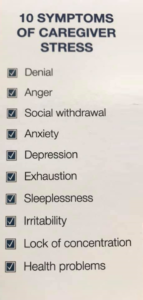This post describes, in part, the effects of a degenerative neurological condition called Huntington’s Disease. Any negative behavior on the part of my wife should be attributed to that condition. Any negative behavior on the part of myself should be attributed to my need for God’s ongoing grace.
If you would like to read our story from the beginning, you can start here: How We Got Here…
Another week past. Another week of watchfulness and (hyper) attentiveness. Another week of waiting for the “train to arrive.”
In the past, I have talked about how having a loved one with a terminal disease is like standing with them on a railroad track and watching the headlight of a train getting closer and closer. Well, to carry the metaphor further, the crossing guard arms are now down, the warning bells are dinging, and the train is blowing its horn.
This week we weighed Janet, and she is down another pound to an even 90 (or a bit under 41 kg). She is eating some, but not enough to maintain her weight – let alone gain any back. The “solution,” of course, is a feeding tube, or peg. However, Janet decided against that option years ago, and has that choice documented in her living will – along with a DNR (Do Not Resuscitate) order.
There have been those, even in our own family, who have asked how I could “allow” that. Now there is a funny word to use in relation to Janet: allow. She has spent her entire life as an independent person doing what she believes is right, and there is every reason to believe that she will die the same way – doing what she believes is right.
But more to the point, even if I were so inclined as to override her long-held wishes (which, by the way, I am not) what would be my logical argument, my justification? There is none.
❦ ❦ ❦ ❦ ❦ ❦
Once I was attending a caregivers conference and I asked how to help our son recognize the seriousness of his mother’s condition. I remember the session leader say,
To which I replied,
– a word play that I guess works better with an American southern accent where “denial” and “da Nile” are pronounced essentially the same.
When you start researching the topic of denial, the first thing you discover is that there is considerable disagreement, even among professionals, about the meaning, importance, and usefulness of denial.
For example, some point out that it is one of the first stages of grief and loss, and so has to be worked through on our way to the final goal of acceptance. Others see denial as a coping mechanism, a form of emotional hysteresis that helps people deal with things that are changing “too fast.” While still others see the term itself as being a way of judgmentally shaming a person into complying with our wishes.
And then there are the related issues, such as when denial takes the form of turning an inherited genetic disease into a “family secret.” But even here we hear people bloviating about “pros and cons” – though frankly I am still trying to find even one “pro.”
Finally, denial is also a lens through which you could view much of what I have written in the past 7 or 8 months. While my intent was to write about grieving, it is equally true that many of those early themes were also about coming to grips with reality and refusing to deny that things had fundamentally changed. To see what I mean, start with this link and, if you haven’t done it before, read all of our story.
From here, there are literally dozens of different directions that this conversation could take, but for now at least, I’ll concentrate on two that I see as being particularly significant for both caregivers and the ones that they are caring for:
Acceptance
The problem with acceptance is that many people think that they have come to accept the reality of what is happening in their lives, but are still living very much in denial. You see, acceptance isn’t just a mental exercise of intellectually recognizing that a given disease will be fatal – someday. It means accepting the reality of the negative consequences today – including those that seem too great to bear.
To begin with, accepting an unpleasant medical diagnosis can also mean admitting a weakness: a potentially bitter pill for someone who has prided themself on their independence and self reliance. Acceptance can also mean facing up to some big fears and scary symptoms.
For example, the list is long of HD patients who have been denigrated for apparent drunkenness, including Janet’s older brother John, who was accused of coming to his daughter’s wedding drunk. But luckily for him, Janet decided to not make her diagnosis a “Family Secret” (see below).
Moreover, many have an almost primal fear of people who are acting strangely or erratically – or of being someone who is acting strangely or erratically. In the same way, many people feel uncomfortable and even threatened by people that they can’t communicate with – whether due to disease or difference in language. We often have images in our mind of what “they” are like, and don’t want to be seen as being one of “them.”
Finally, there is the matter of “burdening” our loved ones. If you are ill, you likely do not want to think about your loved ones dealing with your decline and death.
Consequently, for all of these reasons – and more – we try to think of ways to hide what is going on. Unfortunately, hiding doesn’t work very well:

Family Secrets
While I will be discussing this matter in the context of chronic diseases – especially those for which either the disease, or the predisposition to contract the disease is hereditary – the following discussion would apply equally to any situation in which an individual or family decides to keep secrets including, but not limited to, sexual abuse, addiction, divorce, infidelity – even adoption.
As mentioned above, one of the first things that the “professionals” will tell you about family secrets is that we need to balance the pros and cons of keeping the secret. The problem is that while being open about the challenges that your family is facing may be uncomfortable or even painful, choosing to hide what is going on is truly toxic.
For example, my ex-wife and her new husband decided to attend a church that would not have welcomed them had the church known that she was divorced. To solve the “problem” imposed by the existence of the two children I had fathered, they simply changed the kids’ last names (for the sake of the church) to match their step-father’s. While this might have seemed like an easy solution to a problem, consider for a moment the day-to-day impact that it had on their family life.
Even leaving to one side the basic question of why anyone would want to belong to such an organization in the first place, there were many other ramifications to this one little secret. They couldn’t invite friends from church to school plays or sporting events because the friends might hear the kids being referred to by the “wrong” names. For the same reason, they also had to keep “church friends” separate from all their other acquaintances.
Likewise, when making prayer requests, or seeking counseling on even unrelated matters, they had to worry about whether they are saying too much or whether the request would give away the secret. And imagine the emotional burden of having to watch every word that came out of your mouth to make sure your story stayed consistent – and all that for the comparatively simple secret of a changed last name.
(By the way, in case you are curious, the secret was not kept successfully – my bad – and they were told to leave the church by the pastor.)
Now try to imagine what it is like to try and hide something like a chronic disease. While researching this post, I found this link from a few years ago about the stress of hiding Parkinson’s Disease.
While I understand that people have a variety of reasons for keeping quiet, I also understand that trying to hide the inevitable is the very definition of a quixotic quest. Additionally, when people do find out, you will still have to deal with all the same reactions – plus more. The two most common reactions are anger and disappointment.
- “Why didn’t you tell me? I thought we were friends!”
- “If I had known, I could have done more!”
- etc.
- etc.
- etc.
I also understand the desire for privacy. In fact, as it applies to medical matters, the principle of privacy is (theoretically at least) enshrined in federal law here in the US. According to that law, we “own” our health status, and have the right to decide who else knows about it. But ethically, what happens to the right of privacy when the disease is a family matter? To make things very concrete, if Janet had been more “private,” her brother John might have gone to his grave A) not knowing he was sick, and B) with people thinking he was a drunk.
Still we need to acknowledge that having people know your secret is no guarantee of smooth sailing. There are always the twin problems of Stigma and Shame – which are really the same problem. The only difference between the two is who is doing the judging: Stigma is being judged by someone else and being found wanting. Shame is exactly the same thing except the judge is you.
Unfortunately, even in the 21st century, there are still way too many people who view chronic disease and other misfortunes in life in terms of whose “fault” it is. The people are still with us who asked Jesus why a man was blind, “…did he sin or was it one of his parents?” But in the final analysis, what difference does it really make? We should not stigmatize others, nor should we shame ourselves.
In Christ, Amen ☩
❦ ❦ ❦ ❦ ❦ ❦
A prayer for when you are in denial…
“Blessed are You, Lord God, King of the Universe. It is right that I should at all times and in all circumstances bless You for the certainty that You offer. But today I want to bless you especially for standing by me when I am in denial about the direction that life is taking me. Give me the courage to face the future without flinching. Amen”

